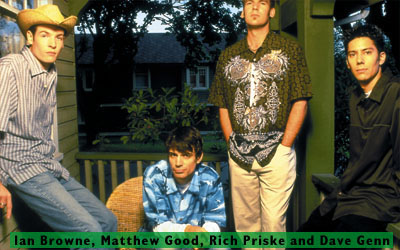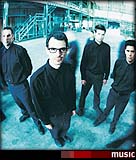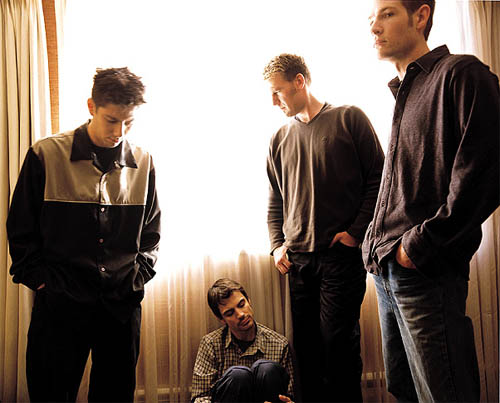


The Matthew Good Band have established themselves as one of the premier rock bands in Canadian music today. Led by singer / songwriter Matthew Good, Rich Priske [ bass ], Dave Genn [ keyboards and guitar ] and Ian Browne [ drums ], this Can-Rock quartet have scored numerous Much Music video awards, two Juno Awards for "Best Group" and "Best Rock Album", Chart artist of the Year, not to mention, holding the most successful Indie record in Canadian music history with 1995's Last Of The Ghetto Astronauts. But how did this all start? Where did it all begin?
During the early 90's Matthew Good had found his niche in the music industry, and had formed a small band with some local Vancouver musicians. This band, which featured a celloist, a violinist and a drummer were very much a folk band, and were limited to half-filled bars and local open mike nights at various venues across Western Canada. In the spring of 1995, while performing a two night gig in Edmonton, Matt suffered an anxiety attack, collapsed and quit this band, vowing to return to Vancouver and set his life on the right track. It was in Vancouver where an early incarnation of the current band began to take shape. Guitar tech - Geoff Lloyd, who worked at a recording studio where Good had earlier recorded a five song demo tape that ended up on CFOX's Vancouver Seeds, joined the band as a bassist, as well as session drummer Charlie Quintana. When Quintana moved on to play for Joan Osborne, his chair was quickly filled by Ian Browne, who had gone to school with Matt. The band quickly added guitarist Dave Genn for help on keyboards and guitars, and together, recorded Last Of The Ghetto Astronauts in 1995.
For an album that was written and recorded over a 4 week span, costing just over $7000, this Indie release did amazingly well. The album's first single, 'Alabama Motel Room' skyrocketed up the charts on Vancouver's local radio station - CFOX, and before the band knew it, LOTGA had become Canadian Music's most successful indie release, selling nearly 26, 000 copies. This new found exposure landed the band the opportunity to open for 'The Who' at Vancouver's GM place, and created a stir within the music industry, as many companies made valiant attempts to sign the country's hottest new rock group.

Ironically enough, it would be American label, Private Music, that would land the rights to sign the band in early 1996. With Dave Genn, now a full time member of the band, the group put together a 5-track EP entitled Raygun. From there, the band planned to return to the studio to record 'Underdogs'. The band was very eager to begin recording, as Gil Norton had been summoned to help produce the album. Unfortunently, due to scheduling difficulties, he would have to produce The Foo Fighters 'Color & Shape', and producer Warne Livesey [ Midnight Oil, Talk Talk ] would step in. The day before recording was scheduled to take place however, MGB was told to stop recording. Private Music's parent company, BMG, had merged the label with Windham Hill Records, an "elevator music label", and had severed all recording promises with the band. After months of contract negotiations, MGB freed themselves from the lable, declared themselves independent and went on to release Raygun as an Indie-record.
With the money made from Raygun the band went about recording Underdogs as yet another independent record. After the fiasco with their previous label, MGB finally signed a deal with A&M Records, giving Underdogs equal distribution throughout Canada. A U.S. release was planned on the Mercury Records label, but due to the merger of A&M / Polygram with Universal Music in late 1997, these plans were cancelled, and the album was never released in America. The first single off of Underdogs was Everything is Automatic. This smash hit was put into heavy rotation across Canada almost immediately, and paved the way for two top 30 singles. Perhaps the most successful single was Apparitions. Not only was this the first song to premier at # 1 across the country, it also received a 1999 Juno Awards nomination for best video and was named Canadian Video of the Year for 1999 by Much Music. In the span of a little over two years, the Matthew Good Band had gone from an indie fluke, to a double platinum, well respected rock group. MGB had dispelled the sophmore jinx, and what was even scarier, was that Matt Good was just starting to prepare for the next album ...
The band toured Underdogs extensively. Hitting local campus' and colleges, and playing in small and medium sized venues throughout the country. Then, in the winter of 1999, MGB returned to the studio to record Underdogs' followup - Beautiful Midnight. Beautiful Midnight marked not only a change in the overall feel of MGB's music, but provided a new face to the band. Long time bassist Geoff Lloyd had withdrawn himself from the band voluntarily, and had been replaced by long time friend of the band, and former DSK bassist - Rich Priske. Together, the band would record over the winter and spring, and tour selectively in the summer, previewing some of the bands new material. Among this new material was the smash single - Hello Time Bomb. That summer, Hello Time Bomb immediately flew to the # 1 spot around the country and thousands of fans eagerly marked September 14 down on their calendars. The highly-anticipated follow-up only confirmed what fans and critics had already figured out: MGB had unquestionably become one of music's most consistently interesting and inventive new groups. Marked by a refreshing blend of smart cynicism and poignant humor, Beautiful Midnight chronicled Good's life in those difficult years between the ages of 16 and 26.

In a puzzling move, that angered many at Universal Music in Canada, MGB was signed by the American label - Atlantic Records. In January of 2001, Atlantic Records began their campaign to market 'Beautiful Midnight' south of the border. A valiant attempt was made, but many Americans, save for the diehard fans, were enthused by an album that was already two years old in Canada, and with an album that sounded so entirely different than what was currently the 'norm' in mainstream America. Two singles would follow stateside - Hello Time Bomb and Strange Days, as well as a small Northeastern tour of the US. According to the band, "we sabatoged our career in America. But we're entirely content with what we have there." Besides album sales, MGB performed quite well, selling out every single one of their shows, and making some noise in the enormous pool of American music. It was during this time, in the spring of 2001 that the band was returning to Vancouver to finish recording the final tracks off of their fourth studio album - The Audio Of Being.
The albums entire birth took place in a hotel in Whistler, British Columbia. It was their that Matthew Good was recovering from the post effects of a gruelling tour, rampant media harassment, and a stomach ailment that had left him intolerably sick. He was also suffering from frequent anxiety attacks that would leave in unconscious. As Matt described it, "I would throw up a lot and I would do that whole Tony Soprano thing, where I would just hit the floor. Having gone through an experience like that where it wasn?t premeditated with drugs or alcohol whatsoever....it just was pure anxiety...like my body shutting down because of stress...it was a very, very bizarre thing and, of course, you get to see things in a bizarre way."